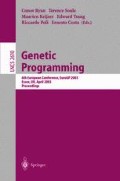Abstract
In this paper, we introduce a new grammar guided genetic programming system called tree-adjoining grammar guided genetic programming (TAG3P+), where tree-adjoining grammars (TAGs) are used as means to set language bias for genetic programming. We show that the capability of TAGs in handling context-sensitive information and categories can be useful to set a language bias that cannot be specified in grammar guided genetic programming. Moreover, we bias the genetic operators to preserve the language bias during the evolutionary process. The results pace the way towards a better understanding of the importance of bias in genetic programming.
Access this chapter
Tax calculation will be finalised at checkout
Purchases are for personal use only
Preview
Unable to display preview. Download preview PDF.
References
Banzhaf W., Nordin P., Keller R.E., and Francone F.D.: Genetic Programming: An Introduction. Morgan Kaufmann Pub (1998).
Candito M. H. and Kahane S.: Can the TAG Derivation Tree Represent a Semantic Graph? An Answer in the Light of Meaning-Text Theory. In: Proceedings of TAG+4, Philadelphia, (1999) 25–28.
Cohen, W. W.: Grammatically Biased Learning: Learning Logic Programs Using an Explicit Antecedent Description Language. Technical Report, AT and Bell Laboratories, Murray Hill, NJ, (1993).
Gruau F.: On Using Syntactic Constraints with Genetic Programming. In: Advances in Genetic Programming II, The MIT Press, (1996) 377–394.
Geyer-Schulz A.: Fuzzy Rule-Based Expert Systems and Genetic Machine Learning. Physica-Verlag, Germany, (1995).
Hoai N. X.: Solving the Symbolic Regression Problem with Tree Adjunct Grammar Guided Genetic Programming: The Preliminary Result. In: the Proceedings of 5th Australasia-Japan Workshop in Evolutionary and Intelligent Systems, (2001) 52–61.
Hoai N. X., Mac Kay R. I., and Essam D.: Solving the Symbolic Regression Problem with Tree Adjunct Grammar Guided Genetic Programming. Australian Journal of Intelligent Information Processing Systems, 7(3), (2002) 114–121.
Hoai N.X., Y. Shan, and R. I. MacKay: Is Ambiguity is Useful or Problematic for Genetic Programming? A Case Study. To appear in: The Proceedings of 4th Asia-Pacific Conference on Evolutionary Computation and Simulated Learning (SEAL’02), (2002).
Joshi, A. K. and Schabes, Y.: Tree Adjoining Grammars. In: Handbook of Formal Languages, Rozenberg G. and Saloma A. (eds) Springer-Verlag, (1997) 69–123.
Joshi, A. K.. Levy, L. S., and Takahashi, M.: Tree Adjunct Grammars. Journal of Computer and System Sciences, 10 (1), (1975) 136–163.
Koza, J.: Genetic Programming, The MIT Press (1992).
Koza, J.: Genetic Programming II, The MIT Press (1994).
Mitchell T. M.: Machine Learning. McGraw-Hill, (1997).
Micthell T. M., Utgoff P., and BanerJi R.: Learning by Experimentation: Acquiring and Refining Problem-Solving Heuristics. In: Machine Learning: An Artificial Intelligence Approach. Springer-Verlag, (1984) 163–190.
O’Neil M. and Ryan C.: Grammatical Evolution. IEEE Trans on Evolutionary Computation, 4 (4), (2000) 349–357.
Schabes Y.: Mathemantical and Computational Aspects of Lexicalized Grammars, Ph.D. Thesis, University of Pennsylvania, USA, (1990).
Shanker V.: A Study of Tree Adjoining Grammars. PhD. Thesis, University of Pennsylvania, USA, 1987.
Utgoff P.: Machine Learning of Inductive Bias. Kluwer Academic Publisher, (1986).
Weir D. J.: Characterizing Mildly Context-Sensitive Grammar Formalisms. PhD. Thesis, University of Pennsylvania, USA, 1988.
Valiant L.: A Theory of the Learnable. ACM, 27(11), (1984) 1134–1142.
Whigham P. A.: Search Bias, Language Bias and Genetic Programming. In: Genetic Programming 1996, The MIT Press, USA, (1996) 230–237.
Whigham P. A.: Grammatical Bias for Evolutionary Learning. Ph.D Thesis, University of New South Wales, Australia, (1996).
Wolpert D. and Macready W.: No Free Lunch Theorems for Search. Technical Report SFITR-95-02-010, Santa Fem, NM, 87501.
Wong M. L. and Leung K. S.: Evolutionary Program Induction Directed by Logic Grammars. Evolutionary Computation, 5 (1997) 143–180.
Author information
Authors and Affiliations
Editor information
Editors and Affiliations
Rights and permissions
Copyright information
© 2003 Springer-Verlag Berlin Heidelberg
About this paper
Cite this paper
Hoai, N.X., McKay, R., Abbass, H. (2003). Tree Adjoining Grammars, Language Bias, and Genetic Programming. In: Ryan, C., Soule, T., Keijzer, M., Tsang, E., Poli, R., Costa, E. (eds) Genetic Programming. EuroGP 2003. Lecture Notes in Computer Science, vol 2610. Springer, Berlin, Heidelberg. https://doi.org/10.1007/3-540-36599-0_31
Download citation
DOI: https://doi.org/10.1007/3-540-36599-0_31
Published:
Publisher Name: Springer, Berlin, Heidelberg
Print ISBN: 978-3-540-00971-9
Online ISBN: 978-3-540-36599-0
eBook Packages: Springer Book Archive

